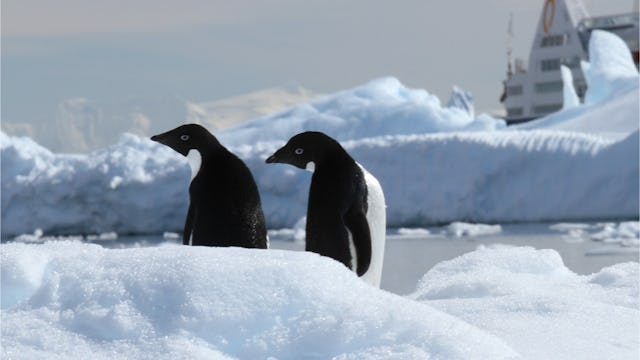Thousands Of Penguin Chicks Die In Devastating Antarctic Breeding Season

“Catastrophic” event is a result of climate change
A breeding season is being described as “catastrophic” by experts after all but two baby Adélie penguin chicks died in Antarctica. Of the more than 18,000 breeding pairs, thousands of starved chicks and unhatched eggs were found.
According to officials at the World Wildlife Fund, the disaster was, in part, because of a larger than normal amount of sea ice late in the season caused by climate change.
Yan Ropert-Coudert, the senior penguin scientist at the French National Center for Scientific Research (CNRS), said the East Antarctic area “has been affected by environmental changes that stem from the breakup of the Mertz glacier in 2010,” Global News reported.
Sadly, this most recent season has not been the worst for the Adélie penguin. In 2013, there were no surviving chicks after heavy sea ice and abnormal temperatures led all the babies to freeze to death.
Experts said this additional ice caused adult penguins to have to swim further in search of food, leaving their babies starving and without protection against rain and cold temperatures. Now, conservation groups have created a call to action to build protection areas in the east Antarctic to help protect future colonies.
The protection proposal is being presented at a meeting this week of the Commission for the Conservation of Antarctic Marine Living Resources (CCAMLR). “This devastating event contrasts with the image that many people might have of penguins,” Rod Downie, Head of Polar Programmes at WWF, said. “It’s more like ‘Tarantino does Happy Feet’ with dead penguin chicks strewn across the beach in Adelie Land.”
Last year a NASA-funded study found that approximately “30 percent of current Adélie colonies may be in decline by 2060, and approximately 60 percent of the present population might be dwindling by 2099.”
WWF also believe a ban on local krill fishing could help to secure the survival of many Antarctic species, including the Adelie penguins, and have been supporting scientists’ research in the region since 2010.
“The risk of opening up this area to exploratory krill fisheries, which would compete with the Adélie penguins for food as they recover from two catastrophic breeding failures in four years, is unthinkable,” Downie said.
According to The Guardian, “the link between climate change and the sea-ice extent around Antarctica is not very clear. Sea ice has been increasing in recent years, which could be attributed to a rise in the amount of freshwater in the ocean around the continent caused by climate change. However, over the long term, climate change is expected to cause the sea ice to shrink dramatically.”
As experts seek to find solutions to help protect future generations of Adélie penguins, this most recent devastation is a heartbreaking reminder how much is at risk from our changing climate.